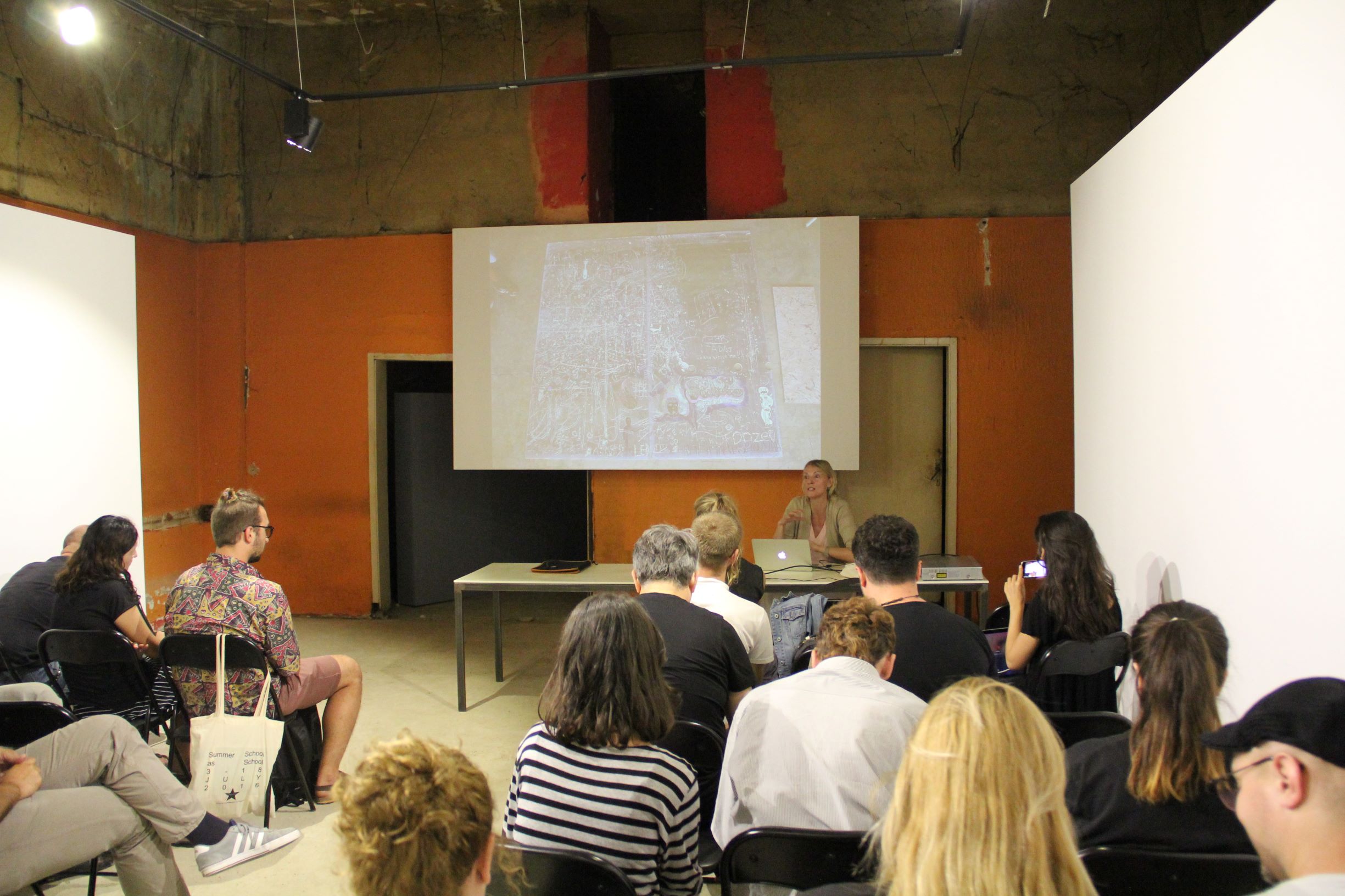
Summer School as School
3- 18 July, 2016
Public Program
Monday, 14 July 2016 at 19:00
Milica Tomić: Reassembling - Art and its relation to waged labour
Venue: Boxing Club
Mark Isaku St. Prishtina
Republic of Kosovo
In her talk Milica Tomic will discuss different modes of investigation and interrelations between two projects: Four Faces of Omarska (2010) and Reassembling – Art and its Relation to Wage Labour (2014).
Four Faces of Omarska investigates the historical dynamics of this particular site in which social, economic and political system have conspired to subdue a particular ethnic group. The project explores the transition from socialism to capitalism, which in Yugoslavia entailed the fall of self-managed socialism, the robbery of public property, and the forging of post-war alliances within neo-liberal capitalist society. A place of transition, it is a site in which people are reduced to human waste. Instead of representing such perspectives theoretically and artistically, even in the form of the un-represented, the Four Faces of Omarska exposes itself to such knowledge, learning from it in an attempt to open up a space of subjectivation and emancipation.
Reassembling – Art and its Relation to Wage Labour investigates the interplay of labour, politics, economy and art within participatory production of a work of art (e.g. ‘UNTITLED’, Rudolf Stingel, 2002). 'RE-‐ASSEMBLING' reveals the labour behind such an artwork; analyses its stability through the network of exploitation underpinning its production, as well as exhibiting strategies within practices often referred to as relational aesthetics and participatory art. 'REASSEMBLING' analyses mechanisms of artistic practices that insist on producing a new type of collective, one devoid of repressive relations within collective labour. Whilst appearing to invite participation, the very act of calling for participation is also the site of the artist's control and monopoly over the outcome. It is precisely by appearing to be offering his/her creative labour and status up for collective use that the artist simultaneously reserves absolute authorship. Despite their claims on emancipating democratic practices, these mechanisms are, in fact, a reflection of the ideology of participation in civic society and parliamentary politics.
Tomić’s interview with Eugster is part of her larger installation Reassembling – Art and its Relation to Wage Labour where she questions the suppression of labour processes in contemporary art practice. Her special focus is artist Rudolf Stingel whose ‘relational aesthetic’ works supposed to underline process instead of the object of art practice.
Tomić by interviewing Eugster who realizes and produces Stingel’s supposed process based works, magnifies the neo-‐liberal and commodity based logic behind these practices; i.e. she makes audible the suppressed ‘noises’ of relational aesthetics. As Tomić herself in interview makes clear, she ‘disconnects’ the fabricated relations. We have kept interview in its raw vernacular form, which follows one digression after another. These unlimited associations of contemporary art work is very similar to singularity of capitalism; as Peter Halward wrote that “the singularity of any one commodity qua commodity implies the singularity of the market mechanism that commodifies it” (Hallward, Absolutely Postcolonial, p. 8). The abundance of digressions and associations in interview, regarding production of one art work, clearly implies that often the singularity, or so-called ‘aura’, of an art work is nothing but singular fetish of commodity capitalism. (Sezgin Boynik)
Milica Tomić [Belgrade, Yugoslavia] is an artist and a head of Institute for Contemporary Art at the TU Graz She explores different genres, methods and practices that centers on investigating, unearthing and bringing to public debate issues related to political violence, economic underpinnings and social amnesia, with particular attention to the short circuit between intimacy and politics. Tomić is a founding member of a New Yugoslav art/theory group Grupa Spomenik [2002]; she conceived and initiated Four Faces of Omarska project and the Working Group FFO[2010].
Tomic has participated in international exhibitions such as 24th Sao Paulo Biennale [1998], 49th/50th Venice Biennale [2001/2003]; 8th International Istanbul Biennial [2003]; Populism, Stedelijk Museum, Amsterdam/Frankfurter Kunstverein [2005]; 15th Sydney Biennale [2006]; Prague Bienniale [2007]; Manufacturing Today/Trondheim Biennale [2010]; 6th International Biennial of Contemporary Art in Gyumri, Armenia [2008]; 10th Sharjah Biennial [2011], Odessa Biennial [2013], After Year Zero /Forensis, House of World Cultures, Berlin, Germany [2013/2014], Invisible Violence, Museum of Contemporary Art, Belgrade / Basque Museum-Centre of Contemporary Art, Vitoria [2014]; The School of Kyiv - The Biennial [2015]; Monuments Should Not be Trusted, Nottingham Contemporary [2016]; Red Africa Calvert 22 [2016].